Week 0 College Football Awards: 7,000 Miles of The Good Stuff
This was supposed to be a tune-up… but it felt like the real thing!
In college football, even the appetizers are overwhelming. They taste pretty good, too.
Saturday was Week Zero of the college football season, the annual awkward pre-opener to the regular season. It wasn’t supposed to be a particularly interesting day. Week Zero games generally aren’t good matchups, but rather random games between teams that fulfilled specific requirements to receive NCAA waivers to play a week early. (The three exemptions main exemptions: Games in foreign countries, nationally televised FCS games, and games with teams that have to play at Hawai’i during the season.) There were just seven Division I games and only two between FBS teams, and six of the games had double-digit point spreads.
Instead we got 7,000 miles and 14-ish hours of the good stuff.
A day that started with a banger in Dublin stayed strong through the midnight shift in Honolulu. All seven games had second-half lead changes, and five of them were decided by a single score.
What makes college football great, though, is not just competitiveness, but the fact that each game had a compelling story—and I’m gonna write a bit about every damn one of them.
I’m going to be writing a college football recap newsletter every week. (I will not be continuing the “write about every damn game” policy throughout the season. Sorry.) I’m planning on publishing the recaps every Monday, because I think the writing will be better if I take some time with it rather than trying to rush it out before everybody gets distracted by the NFL on Sundays at 1 p.m. You can subscribe right here:
Honestly, this was a great tune-up. Just like the teams that walked into these games as multi-TD favorites but found themselves fighting for their lives in the fourth quarter, I thought this was supposed to be light work. And when Week Zero came to play, it put me on my ass a bit. But this week snapped my channel-changing form into regular season shape and I’ll be ready to compete next week. Let’s get it.
Week 0 Champion: Georgia Tech
Florida State won 13 games before losing last year. When that wasn’t good enough to make the playoffs, they blamed the weak opponents they played in the ACC for not providing enough prestige to get them selected. They’ve since filed a lawsuit to potentially leave the conference for a more rigorous, more lucrative league.
This year, Florida State went zero games before losing, as their wish for a tougher conference schedule was immediately granted. They lost the very first game of the college football season to Georgia Tech on a last-second field goal in a standalone showpiece game in Ireland:
It’s fun to think of this as a plucky fluke upset, but the reality is even more fun: Florida State flew a top-10 ranking and tens of thousands of fans across the ocean to get their asses kicked by Georgia Tech on international TV. As 11-point underdogs, the Bees from the A shoved the ball down FSU’s throats over and over and over. They had three 10-play drives. They averaged more yards per pass and more yards per rush than the Noles.
Aaaaand here’s the caveat section. This shock upset means less than it would’ve meant a year ago. There’s now a 12-team playoff with a more-or-less guaranteed slot for the ACC champion, so while last year going 13-0 wasn’t good enough to get Florida State into the 4-team bracket, they’re still alive even after this loss. Hell, they can probably even lose another game. Maybe two more! The committee members can count this loss a little bit less than a regular loss because it took place Week Zero in a game with a weird setting. The Noles will need to stop teams from running the ball down their throats, and DJ Uiagalelei will need to appear capable and/or interested in completing passes beyond the line of scrimmage, but those are both doable.
But in this sport, the big picture is less interesting than the moment.
I’ve watched hundreds of beautiful college football games that ultimately didn’t matter. I even watched one in Ireland. I watched Northwestern, a team I assumed would suck, beat Nebraska as 13-point underdogs in Dublin. I had the time of my life with some people I’ll never talk to again in a place I’d never been to. We grinned ear-to-ear speculating about how surprisingly good this team was going to be, and we raised our pints. We cheered when a bunch of Northwestern players walked into the bar.
And then Northwestern lost 11 straight games to finish the year. Doesn’t matter. One weird win means more to me than 11 normal losses. The Guinnesses still count.
A great football moment isn’t about what happens next. It’s about how you felt in the moment and who you felt it with. It’s about the bewildered Georgia Tech fan who spent a euphoric night roaming around Dublin trying to get Irish people to yell the words HELLUVA ENGINEER with them. It’s about picturing a Florida State fan staring at the hotel ceiling, thinking about how they dropped $5k to fly across the ocean to watch their team lose to Georgia freakin’ Tech. Hell: It’s about us, grateful for this sport to be back, cracking up on our couch as an expected snoozer turns into an all-timer.
The people in charge of this sport can make the playoffs 4 or 12 or 64 teams. They can play games in Ireland or on the moon. They can kill off conferences and make others unrecognizable. They can change a million things you love about this sport, and they will.
But they can’t take the sheer glee out of a contender getting walloped in a game they thought they’d dominate. The way college football looks will change over and over again.. But nobody can ever change the way college football feels.
Breakthrough of the Week: Interviewing the Band
This year’s HBCU kickoff game wasn’t supposed to be close—Florida A&M won last year’s Black National Championship while Norfolk State went 3-8. But the Spartans led early and had a shot at the W late. They decided to attempt a go-ahead two-point conversion with 6 minutes left after a FAMU penalty moved the PAT to the one-yard line. But they couldn’t get the yard. The Rattlers ran out the last six minutes of clock to win by a point. That type of suffocating ending is traditionally more of a boa constrictor move than a rattler, but still snakey enough.
But there are great football games every week. What made this game groundbreaking was ESPN’s decision to send a sideline reporter to interview marching band members coming off the field after their performances:
HBCU band members are infinitely better at giving quotes and more interested in smack talk than actual football players and coaches, who have been trained to say “we’re taking it one play at a time” and “we just need to Finish Strong” over and over again. I particularly appreciated the Spartan Legion member who said the band’s uniforms were “hot on the outside, but we’re cold on the inside” and appeared dumbfounded and upset when he learned FAMU didn’t have dancers in their show.
Keep this up, ESPN! I’ll take interviews with band members, gameday ops crew, tailgate masters, and hopefully, random fans all season long. '
The Lower Division Performance of the Week: Montana State
Montana and New Mexico are both gorgeous, rugged, mountainous states with two Division I college football teams. In one state, those two teams compete for national titles and play in front of sellout crowds. The other has two generally awful teams that need to scrap for rare wins against unfortunate opponents like UMass and Auburn. The difference is that Montana’s teams are powerhouses in the second-tier FCS while New Mexico’s teams are at the bottom of the upper-tier FBS.
So when New Mexico paid Montana State $360,000 to play their season opener in Albuquerque, the Bobcats were actually 13.5-point favorites—the largest spread in recorded betting history in favor of an FCS team on the road against an FBS team.
However, the Lobos were ready to win in their first game under unretired head coach Bronco Mendenhall. They had two scoop-and-scores and took a 17-point lead on the Bobcats heading into the fourth quarter. They also mustered up a solid home-field advantage with a near-instant transition from 90-degree New Mexican sun into winds so powerful that trash and tents started flying around and a big camera fell off the top of the stadium.
Montana State was unfazed. (Honestly, New Mexico probably should’ve stuck with the heat rather than switching to wind against people from Montana.) The Bobcats scored 21 unanswered points in the fourth quarter and won the game on a go-ahead touchdown with 10 seconds left:
Despite having smaller rosters, playing on the road, and essentially giving away two touchdowns to their opponents, Montana State simply had better players than their opponents from the higher level.
Drop down, New Mexico! This can be yours! Live life as a small king rather than a big fool!
College Football Place of the Week: Ireland
Even as someone with family in Ireland (by marriage, but that’s family imo) and multiple appearances on The Irish NFL Show, I’ve always found the semi-annual kickoff game in Dublin a bit strange. Ireland doesn’t have a historic connection to American football, doesn’t have significant American football infrastructure and doesn’t have a huge population yearning to see games. (They actually have their own football.) Yes, there are fans of American football in Ireland but one thing I’ve learned as an online football writer…. there are fans of American football just about everywhere. (Putting football in movies and TV shows for a few decades really paid off.)
The kickoff game in Ireland was created for a few reasons. ESPN is eager to air games a week early—the more broadcast windows, the better—and the NCAA has a waiver allowing Week Zero games if they’re in foreign countries. So they want a foreign game, and just need a country to host it. Ireland, which has more annual tourists per year than total residents, is always eager for another opportunity to convince 20,000 Americans to hop on a plane. And so: football in Ireland, a child of technicalities.
But they’re getting pretty good at hosting it. It’s the third straight year with a game in Dublin, a big change from the sporadic arrangement where they hosted three games between 2012 and 2021. And there’ll be games again next year and in 2027. (It’s unclear whether they’re working on something for 2026 or taking the year off.) And this year, ESPN brought College GameDay in Dublin, the ultimate sign that a game is in a certified College Football Place rather than a place that has college football.
And perhaps most importantly, the game felt a bit Irish. Georgia Tech happens to have the only active Irish-born FBS player, Kerryman David Shanahan. As the punter on an offense that rolled all game, Shanahan didn’t have a huge part to play, but did get down the hold on the game-winning kick, ensuring the Irish flag decal on his helmet got in all the celebration shots. And two years ago, I was surprised to learn the game in Ireland wasn’t being broadcast on Irish TV—but Saturday, Irish-language broadcaster TG4 aired the game, making sure Irish people actually saw the game even if they lived on the other side of the island. (I haven’t found any clips of the game-winner in Irish yet, but here’s a billingual post-game interview with Shanahan.) Georgia Tech did some step-dancing just to secure it.
 Tiktok failed to load.
Tiktok failed to load.Enable 3rd party cookies or use another browser
After Saturday, the game in Ireland now feels like a part of the college football fabric rather than an on-again, off-again arrangement to check certain boxes. Remember: College football things don’t have to make sense. In fact, they’re oten fbetter i thfey don’t.
The Rulebook Is Literally 257 Pages Long Play of the Week: An Unfair Catch
There were good reasons to make SMU 27-point favorites against Nevada. The Mustangs are proud ponies after winning the American Conference last year and upgrading to the ACC, while Wolf Pack went 2-10 last year and their rebuild has been compared to “a dliapidated car with a family of squirrels living in the front seat.” (A Nevada writer wrote that, so it’s not even an outsider dunking on them.)
But SMU was slopping it up. They gifted a touchdown to Nevada after a bad snap on a punt and kept getting into oddly hostile altercations considering the talent gap and complete lack of history between the programs.
 Tiktok failed to load.
Tiktok failed to load.Enable 3rd party cookies or use another browser
They even had a cornerback ejected for spitting on a Nevada player. The Wolf Pack took a 24-13 lead into the fourth quarter.
Then the squirrels acted up. After allowing a touchdown, SMU booted the ball into the end zone on the kickoff, and Nevada return man Ashton Hayes called for a fair catch. ?He dropped the ball, picked it up on the 1-yard line and started running.
But the refs blew their whistles and returned the ball to the 1. The announcers seemed surprised, as did the players. Two plays later, SMU got a safety, and the momentum had officially shifted. SMU might have won anyway, but this was the moment the upset felt over.
One thing you’ve gotta know about me: I get really hyped writing about unusual special teams scenarios. So I’ve gotta explain the unfortunate confluence of rules which screwed Nevada over here.
If a player signals for a fair catch, they can’t advance the ball—even if they drop it. That makes sense! It’s essentially the same logic as the infield fly rule, preventing cheeky “drops” to lure the kicking team into a false sense of security. So for all intents and purposes, getting a fair catch is roughly the same as calling for a fair catch, dropping it, and immediately recovering the loose ball.
The one case the outcome is significantly different is on kickoffs, where the ball gets magically advanced to the 25-yard line after a fair catch as if it’s a touchback—a rule change made in 2018 to discourage returns due to the massive injury concerns around kickoff returns. But that only happens if the fair catch is, you know, a catch. If the player drops the ball, they lose the magical advance to the 25, and yet they still aren’t allowed to attempt advancing the ball. The team gets the ball at the spot of the recovery and not the 25. The rulebook actually outlines this specific scenario on page 203, in the immense Approved Rulings section. (I believe this outcome was also possible in the NFL last year—the league introduced the “fair catch moves ball to the 25” rule in 2023, but immediately eliminated it with their new kickoff format. I don’t believe anybody messed up in this specific fashion, though.)
So if you drop a kickoff without a fair catch, it’s not a problem—just pick it up and return it. And if you drop a punt after a fair catch signal but manage to recover the ball, it’s not a problem either—you get the same outcome as a fair catch. But if you drop a kickoff after a fair catch signal, you lose about 20 yards and get the worst field position possible. Getting the ball at the 1-yard line is about two expected points worse than getting it at the 25, per various models, so dropping a fair catch on a kickoff is about as bad as missing a tough field goal.
It feels like poor rule-writing. The whole point of the rule is to get teams to accept decent field position in exchange for a play with fewer injury risks for players. Why discourage teams from accepting that deal by throwing in a potentially huge negative outcome for a relatively small mistake?
On the other hand... CATCH THE BALL! Catch it! Catch the ball!
LVP: Delaware State’s bus company
The entirety of Week Zero is a testament to how difficult it is to travel to Hawai’i. The reason for the week’s existence is that it costs so much money for teams to fly teams to and from Hawai’i that the NCAA allows Hawai’i and their home opponents to play a 13th game to recoup the travel costs. This is why Week Zero is so heavy on Mountain West action—Nevada and New Mexico are future Hawai’i visitors exercising their 13th game rights.
You’d think Hawai’i would make this easier by scheduling opponents from the west coast. But for some reason, they’ve decided to almost exclusively schedule FCS opponents from the Northeast, roughly 5,000 miles away. Last year they flew out the Albany Great Danes, speculated to be the longest trip in college football history. (The Danes are WAY closer to Ireland.) The year before it was Duquesne from Pittsburgh, a team which also made the trip in 2018. I have no idea what the logic is here. It feels like it would be cheaper to pay Chaminade to start a football program to give Hawai’i somebody closer to play at this point.
This year’s opponent was Delaware State—as the announcers proudly pointed out, a matchup between the first and 50th states. The Hornets were supposed to take a bus from Delaware up to New York, then fly 11 hours to the islands—but due to confusion with the bus company, the Hornets missed their flight, forcing the team to scramble to book individual tickets on a bunch of different commercial flights to Hawai’i to get the team to the islands.
But the Hornets had fight! Despite Vegas posting Hawai’i as 40-point favorites, Delaware State actually tied the game up in the second half before Hawai’i pulled away and won 35-14. Perhaps on an even playing field, the Hornets might have had a chance. But after a massive transit blunder threw a wrench into the longest road trip possible, robbing the team of critical adjustment time before a game starting at midnight Eastern (and, presumably, some time at the beach), they just didn’t have the juice.
I’m throwing the bus company under the bus here. (But if I throw a bus company that doesn’t show up under the bus, is anybody actually going to drive over them? Hmm.)
The Misuse of Public Funds Coaching Decision of the Week: McNeese’s field goal
In one brilliant half, it all started to come together for the downtrodden McNeese Cowboys. After going winless last year—technically 1-10, but the one win was a forfeit after Northwestern State abandoned their season—the Cowboys fell behind 26-7 in the first half against ranked, heavily favored Tarleton State. And then came the turnaround. The defense stepped up and blanked Tarleton for the entire half. New quarterback Clifton McDowell, who led Montana to the national championship game last year, started drilling passes and fighting orf first downs on his feet. They scored 16 unanswered points and were driving down three points.
But they were thwarted by a series of baffling end-game decisions by head coach Gary Goff. A quick rundown:
—scoring a touchdown down 16 points and kicking an extra point, voluntarily keeping it a two-score game instead of going for two… and the kicker missed the extra point anyway
—letting the clock run from 51 to 11 seconds without calling a timeout when they had two, eventually needing to call a timeout anyway to avoid a run-off after a false start
—settling for a 44-yard field goal on third down with 10 seconds left despite having a timeout with the kicker who just missed the extra point
—ignoring the fact that the kicker would be kicking into the eyes of Chubbs Peterson, a gator, and Abraham Lincoln:
It missed. Thanks to their coach, the Cowboys have to wait a bit longer for their first win since 2022.
Play Design of the Week: The Swinging Gates
Over the course of a season, I feel like the ratio of “times a team lines up in the swinging gate formation, checks up, then kicks the extra point” is like 500-to-1.
But Saturday, three separate teams actually kept their gates open and went for two, all on their first scores of the year.
Florida State converted a 2-pointer on the very first touchdown of the FBS season, with a jet motion removing a defender from in front of the gate and a perfect sideways snap from walk-on wide receiver Jeremiah Giedrys.
McNeese did it too and seemed to have pulled off an easy conversion, but was flagged for pass interference:And then North Alabama did it against Southeast Missouri, again on the first touchdown of the game.
https://x.com/CoachDanCasey/status/1827492551936327986
There are three possibilities here: The first is that it’s Week 1, and special teams units are just a bit sloppier than they should be. None of the defenses here matched up, and were punished for flawed fundamentals. The second is that coaches simply love the idea of getting a not-particularly-useful trick play on tape on their very first drive to make sure opponents have to spend the next five months working on it.
The third, and least plausible, is that football has fully entered the Swinging Gate Era, and we can expect to see coaches turning sevens into eights on PAT attempts all year long through the magic of one-man offensive lines and throwing punters. Don’t be surprised if an enterprising coach decides to run the All Swinging Gate offense.





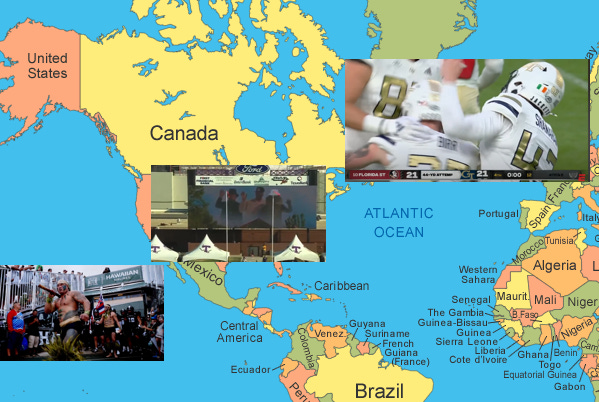
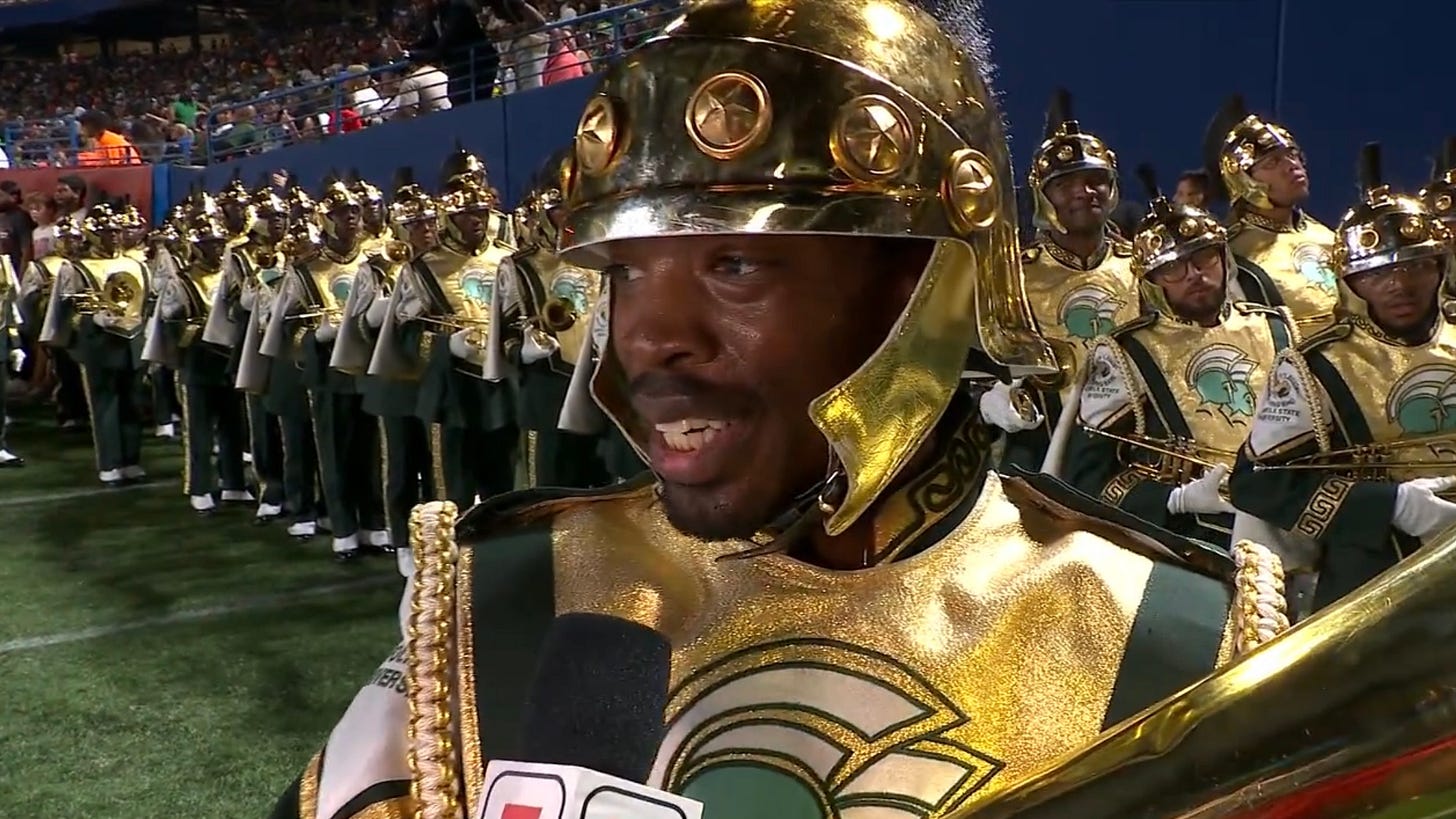
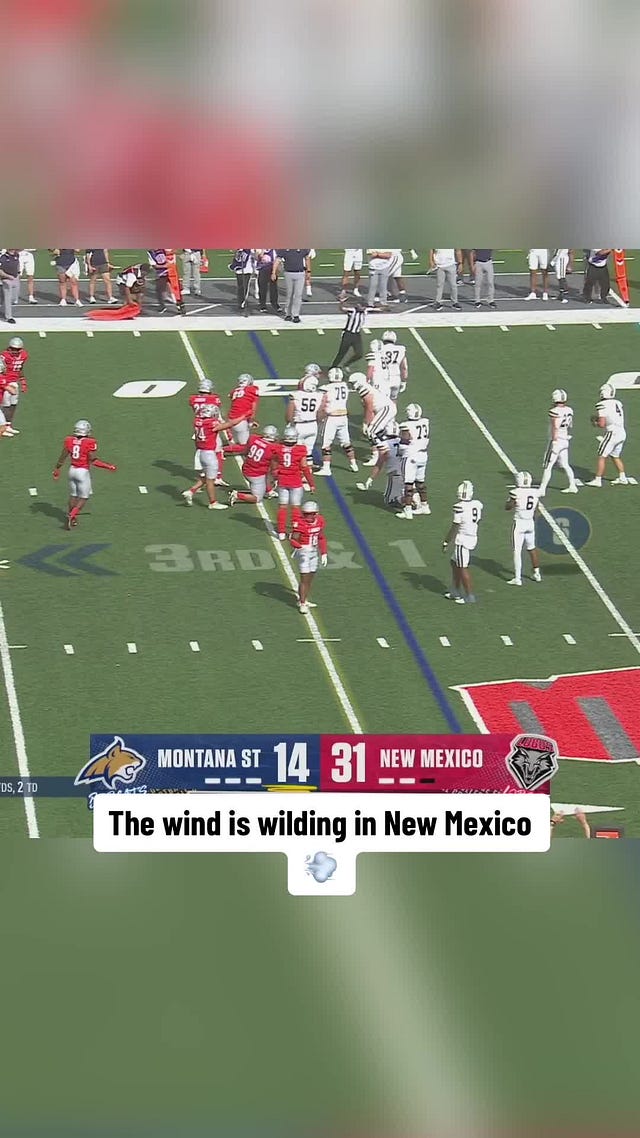
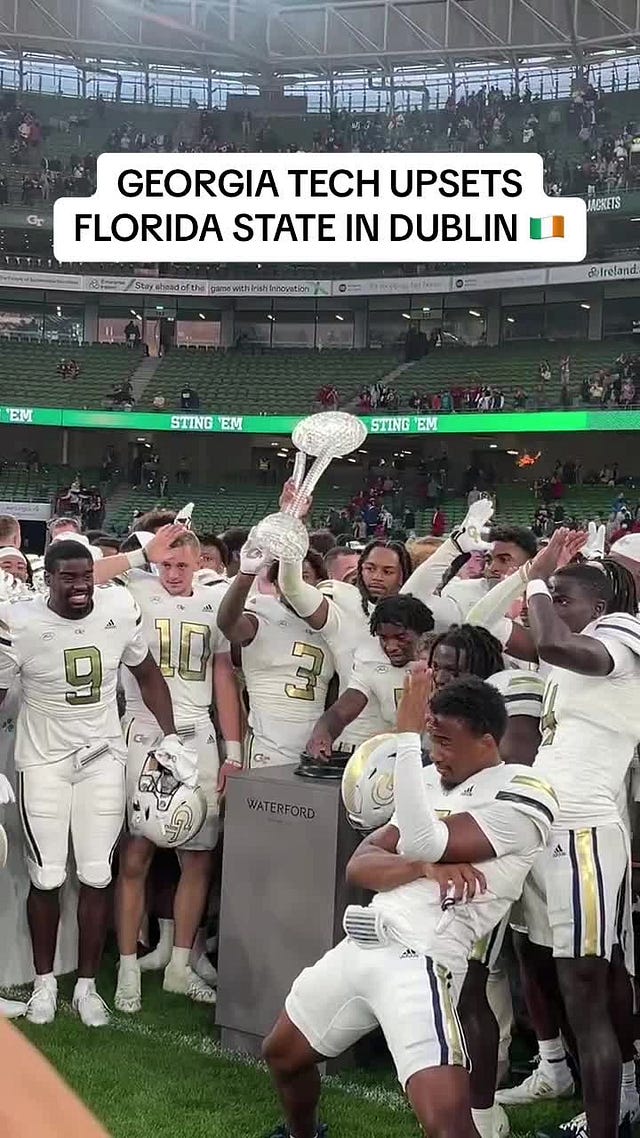
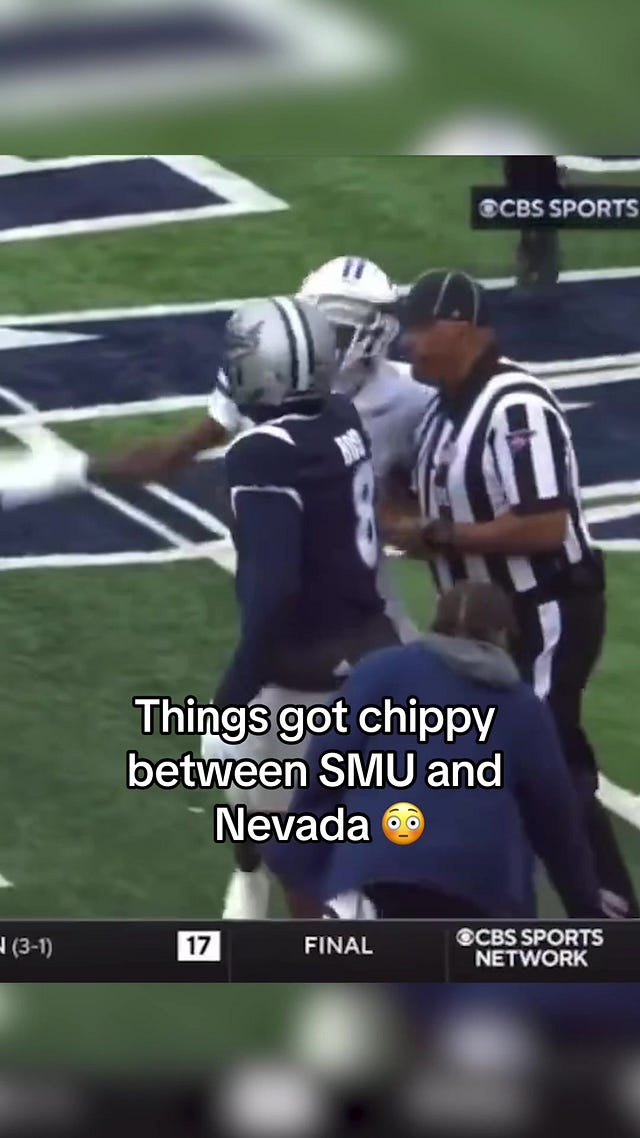

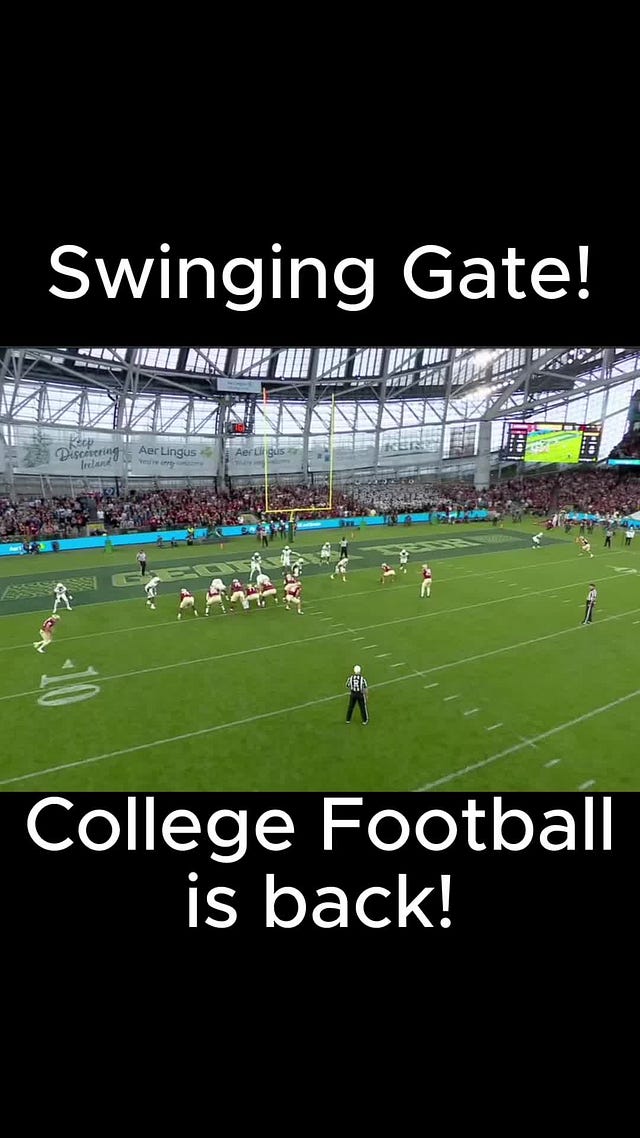
That kickoff rule actually featured in the Michigan-Ohio State game in 2021. It was the buckeye's first drive (second KO of the game) and the refs were walking the ball to the 25 when Harbaugh ran down the sideline to intervene. Everyone else was confused, the bucks started their first drive inside the 5 and went 3 and out and setup Michigan with great FP on the next drive...that ended with a Cade Macnamara pick in the EZ. Had it led to 6 instead, I imagine everyone would remember that weird rule.
We need more Rodg!!! Please and thank you good sir!!